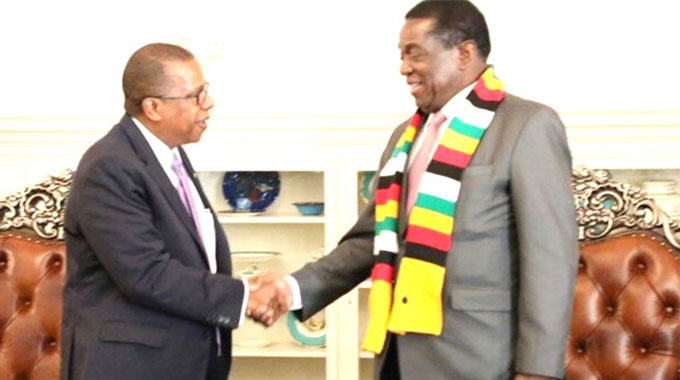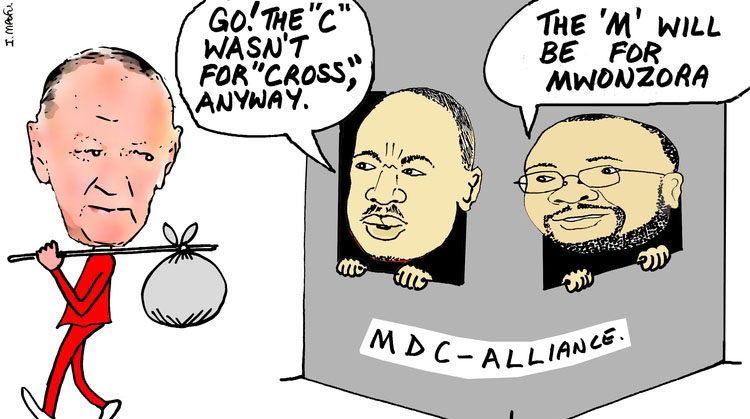EDITORIAL COMMENT : US must engage Zim with mutual respect

WHEN President Mnangagwa met the United States’ new envoy Mr Brian Nichols, it was a positive sign that both parties wanted to demonstrate that bridges had not entirely been burnt.
The Zimbabwean leader also showed that his open-door policy is still there.
The meeting between the President and the US top diplomat took place exactly a week after President Trump assented into law (on Wednesday, August 8, 2018), the S 2779 “Zimbabwe Democracy and Economic Recovery Amendment Act of 2018,” which amends the Zimbabwe Democracy and Economic Recovery Act of 2001.
Even though the continuation of the illegal sanctions regime has not brought joy to Zimbabweans, in this enlightened world, we continue to interface and remain optimistic that soon, the US and Zimbabwe will find each other and have healthy and unconditional bilateral relations.
The process of re-engagement has started and the Zimbabwean Government has demonstrated its keenness to ensure that it becomes part of the community of nations, together with the United States.
However, what is worrying is the seeming element of mistrust between the US administration and Zimbabwe, with the former preferring to rely on information supplied by opposition parties, ignoring in the process Government efforts.
This was apparent when the US Congress passed the sanctions bill on July 27, three days before Zimbabwe went to the polls. What informed the US Congress and Senate to arrive at such a critical decision on the eve of the July 30 harmonised poll?
The amended sanctions law sets stringent measures that Zimbabwe should follow before economic relations can be normalised.
Thus the past 17 years, especially the just-ended harmonised elections have shown that normalisation of relations between the US and Zimbabwe is not an event, but a painful process.
The opposition MDC-Alliance in particular is probably thrilled that the pointers they gave to the US Congress and Senate make up a large chunk of the amended law.
The amended law is similar to demands made by the MDC-Alliance through its Plan and Environment for A Credible Election (PEACE) document launched by their presidential candidate Nelson Chamisa.
Chamisa and fellow principal in the MDC-Alliance coalition, Tendai Biti and Dewa Mavhinga — the director of Human Rights Watch in Southern Africa, a Western sponsored organisation — appeared before the same US Senate committee on December 13 last year and urged the US government to maintain the current sanctions regime on Harare.
When the Zdera Amendment Bill was initially tabled, some Zimbabwe Government officials said in June the move came with preconditions, which threatened to overreach US influence in the internal affairs of Zimbabwe.
This followed sentiments raised by President Mnangagwa during a trip to Abidjan, Cote d’Ivoire where he called on the US to make decisions on Zimbabwe from an informed perspective, instead of using the MDC-Alliance as major point of reference.
President Mnangagwa said the US should have an appreciation of the situation on the ground to enable it to make informed decisions.
On Wednesday, he maintained his position when he said about the meeting: “These discussions are necessary. He is an ambassador from the United States to Zimbabwe. He must have correct appreciation of the environment in the country. He came into the country to have that appreciation. We were able to share his views and my views on the current situation in the country and we are moving forward as a country.”
It is thus unfortunate that the US has decided to use the events of August 1 to make a determination on Zimbabwe, when it is plainly clear that this Bill was going to be signed into law, even before we went to elections.
They decided to ignore the strides made by the new dispensation to open up political space — a first in post-Independent Zimbabwe’s history.
But we know that Ambassador Nichols and Senators Chris Coons and Jeff Flake, both members of the Foreign Relations Committee, who led the drafting of the proposed amendments to Zdera, have seen that no one except the MDC-Alliance leadership is happy with the sanctions.
People across the political divide have expressed their resentment at the amendment of Zdera, for the sanctions hurt everyone, especially the ordinary people who must be protected by international law and democratic values.
We also question why in this day and age, one nation uses its power and might to interfere in internal affairs of other countries. Where is the United Nations?
If Zdera continues to relate to the opposition MDC-Alliance’s demands, what does that say about the United States’ role in Zimbabwean affairs?
Are sanctions also the only way for the US to deal with perceived foes? Is there no middle ground where people can disagree to agree for the sake of the people — dialogue?
So far, President Mnangagwa has walked the talk. He promised a free, fair, credible and peaceful election, observed by all, the US included. He delivered it.
Why can’t he be trusted if he says an independent commission of inquiry will be set up to look into events of August 1?
While Zimbabwe is not rejoicing over the sanctions, we remain hopeful that the re-engagement process continues in a spirit of mutual trust and respect.







Comments